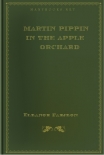Martin Pippin in the Apple Orchard by Eleanor Farjeon (top 10 novels to read .TXT) 📗

- Author: Eleanor Farjeon
Book online «Martin Pippin in the Apple Orchard by Eleanor Farjeon (top 10 novels to read .TXT) 📗». Author Eleanor Farjeon
Besides his trade in metal, Harding also plied the ferry; and then men would speak of him as the Red Boatman. But he could not be depended on, for he was often absent. His boat was of a curious shape, not like any other boat seen on the Arun. Its prow was curved like a bird's beak. And when folk wished to go across to the Amberley flats that lie under the splendid shell which was once a castle, Harding would carry them, if he was there and neither too busy nor too surly. And when they asked the fee he always said, "When I work in metal I take metal. But for that which flows I take only that which flows. So give me whatever you have heart to give, as long as it is not coin." And they gave him willingly anything they had: a flower, or an egg, or a bird's feather. A child once gave him her curl, and a man his hand.
And when he was neither in his workshop or his boat, he hunted on the hills. But this was a trade he put to no man's service. Harding hunted only for himself. And because he served his own pleasure more passionately than he served others', and was oftener seen with his bow than with hammer or oar, he was chiefly known as the Red Hunter. Often in the late of the year he would be away on the great hills of Bury and Bignor and Houghton and Rewell, with their beech-woods burning on their sides and in their hollows, and their rolling shoulders lifted out of those autumn fires to meet in freedom the freedom of the clouds.
It was on one of his huntings he came on the Wishing-Pool. This pool had for long been a legend in the neighborhood, and it was said that whoever had courage to seek it in the hour before midnight on Midsummer Eve, and thrice utter her wish aloud, would surely have that wish granted within the year. But with time it had become a lost secret, perhaps because its ancient reputation as the haunt of goblin things had long since sapped the courage of the maidens of those parts; and only great-grandmothers remembered how that once their grandmothers had tried their fortunes there. And its whereabouts had been forgotten.
But one September Harding saw a calf-stag on Great Down. There were wild deer on the hills then, but such a calf he had never seen before. So he stalked it over Madehurst and Rewell, and followed it into the thick of Rewell Wood. And when it led him to its drinking- place, he knew that he had discovered one more secret of the hills, and that this somber mere wherein strange waters bubbled in whispers could be no other than the lost Wishing-Pool. The young calf might have been its magic guard. To Harding it was a discovery more precious than the mere. For all that it was of the first year, with its prickets only showing where its antlers would branch in time, it was of a breed so fine and a build so noble that its matchless noon could already be foretold from its matchless dawn; and added to all its strength and grace and beauty was this last marvel, that though it was of the tribe of the Red Deer, its skin was as white and speckless as falling snow. Watching it, the Red Smith said to himself, "Not yet my quarry. You are of king's stock, and if after the sixth year you show twelve points, you shall be for me. But first, my hart-royal, you shall get your growth." And he came away and told no man of the calf or of the pool.
And in the second year he watched for it by the mere, and saw it come to drink, no longer a calf, but a lovely brocket, with its brow antlers making its first two points. And in the third year he watched for it again, no brocket now but a splendid spayade, which to its brows had added its shooting bays; and in the fourth year the spayade had become a proud young staggarde, with its trays above its bays. And in the fifth year the staggarde was a full-named stag, crowned with the exquisite twin crowns of its crockets, surmounting tray and bay and brow. And Harding lying hidden gloried in it, thinking, "All your points now but two, my quarry. And next year you shall add the beam to the crown, and I will hunt my hart."
Now at the time when Harding first saw the calf, and the ruin of the castle across the ferry was only a ruin, not fit for habitation, it was nevertheless inhabited by the Proud Rosalind, who dwelt there without kith or kin. And if time had crumbled the castle to its last nobility, so that all that was strong and beautiful in it was preserved and, as it were, exposed in nakedness to the eyes of men: so in her, who





Comments (0)